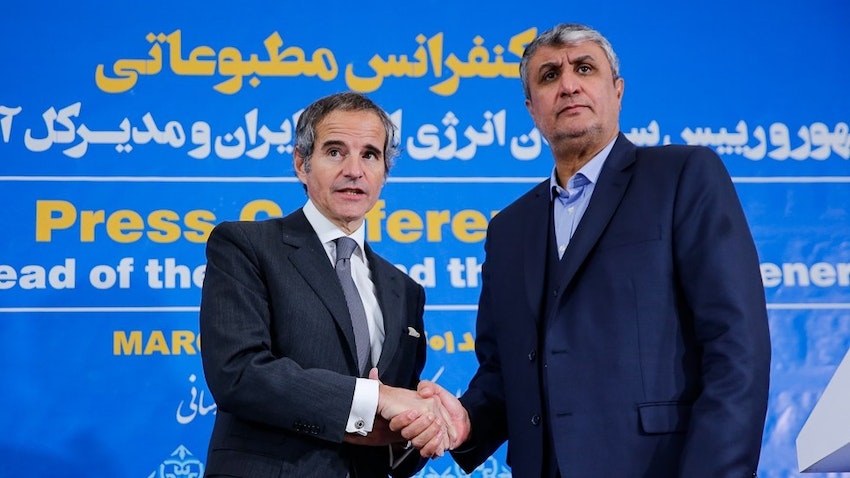Iranian Foreign Ministry Spokesman Nasser Kanani said that Iran did not increase the number of international nuclear inspections at its sites following its new agreement with the International Atomic Energy Agency (IAEA).
The increase in inspections at some sites, including Fordo, was not a new development, but rather "an agreement between Iran and the IAEA defines how and based on what formula they will take place," Kanani said in his weekly news conference on March 6, according to the IRNA news agency.
He also said that there were new developments in IAEA-Iran relations, opening a "new chapter" for bilateral cooperation that would be disclosed in a report of IAEA Director-General Rafael Grossi.
A future visit by an IAEA technical team to Tehran would dispel ambiguities raised by the IAEA and deprive the "opposite side" of a pretext, he added.
He was referring to a series of agreements, including re-installing cameras at several of its nuclear sites shut in June 2022, an investigation into uranium traces at three undeclared nuclear sites in Iran, and the 50% increase in inspections at the Fordo high-grade enrichment site, that were announced by IAEA head Rafael Grossi following his visit to Tehran on March 3-4.
Iran is supposed to provide access to information, locations and people, Grossi told reporters upon his return to Vienna from Tehran.
After the US withdrew from the nuclear deal in May 2018, Iran began gradually increasing its uranium enrichment. Last year, the IAEA Board of Governors censured Iran twice over its alleged lack of cooperation with the Agency's safeguards probe. In reaction to the first censure resolution, Iran removed monitoring equipment from several nuclear sites — including cameras in June 2022. Following the second censure resolution in November 2022, Iran increased the enrichment of uranium to 60% at the Fordow nuclear site.
Bloomberg reported on February 19 that IAEA inspectors had found uranium enriched to a purity of 84 percent — just below the 90 percent required for a bomb. The inspectors are trying to determine if it was produced intentionally.
Grossi’s visit followed the discovery of uranium particles enriched to near weapons-grade level at an underground Iranian facility that came just two days before a quarterly meeting of the IAEA’s 35-nation board of governors.
Meanwhile, the Spokesman for the Atomic Energy Organization of Iran (AEOI), Behrouz Kamalvandi, said that no agreement on granting access to "people" was reached during the visit by the head of the UN nuclear watchdog.
"During the two days that Mr Grossi and the delegation accompanying him spent in Tehran, the issue of granting access to individuals was not discussed, nor was it written down in any document," Kamalvandi told IRNA on March 4.
He also denied that installing new cameras, or the extent of access for inspecting the three undeclared sites, over which the IAEA is at odds with Tehran, was discussed at the meetings.
However, Kamalvandi confirmed that Iran agreed to increase the number of IAEA inspections only at its Fordo (Fordow) nuclear site from eight to 11.
The joint statement issued by the Iranian nuclear body and the IAEA said that "regarding outstanding safeguards issues at the three locations, Iran expressed its readiness to continue its cooperation and provide further information and access to address outstanding safeguards issues".
Following a meeting with Grossi on March 4, Director of AEOI Mohammad Eslami, criticised the three European countries for "failing" to comply with the 2015 nuclear deal known as the Joint Comprehensive Plan of Action (JCPOA), saying that for this reason Iran will manage its negotiations with the IAEA within the framework of the IAEA safeguard agreements.
"Specifically, the three European countries, and those who work with them, focus on the JCPOA-related obligations. These obligations are two-sided. The other side is the obligations accepted by other parties. While they do not honour their obligations, they cannot press us to do the same," the Iranian nuclear chief added.
During a meeting with Grossi, Iran's President Ebrahim Raisi said his country has fully collaborated with the IAEA and expects it to act professionally and resist being "influenced by particular political motivations."
"Some countries, and America is at the top of them, and the Zionist regime use the nuclear issue as a pretext to put more pressure on the Iranian people while this regime (Israel) has not become a member of the IAEA and does not comply with its regulations," the Iranian President’s website reported on March 4.
For his turn, Grossi said that "it is clear now who is responsible for the current situation of the JCPOA" and he blamed the "malevolent" forces that did not favour "successful cooperation" between Iran and the IAEA.







 Russian peacekeeping forces, deployed in the Karabakh (Garabagh) region of Azerbaijan since 2020, have commenced their withdrawal from the area.
Russian peacekeeping forces, deployed in the Karabakh (Garabagh) region of Azerbaijan since 2020, have commenced their withdrawal from the area.
 The number of evacuees from flooded areas in Kazakhstan has reached 97,852 people, including about 32,856 children since March 27.
The number of evacuees from flooded areas in Kazakhstan has reached 97,852 people, including about 32,856 children since March 27.
 The Islamic holy month of fasting, Ramadan comes to an end this week with the celebration of a joyous festival called Eid (meaning “festival” in Ar...
The Islamic holy month of fasting, Ramadan comes to an end this week with the celebration of a joyous festival called Eid (meaning “festival” in Ar...
 Azerbaijan officially unveiled the logo for the upcoming 29th session of the Conference of the Parties to the United Nations Framework Convention o...
Azerbaijan officially unveiled the logo for the upcoming 29th session of the Conference of the Parties to the United Nations Framework Convention o...



